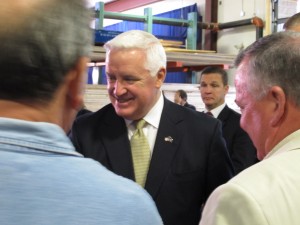House Measure Preempts Local Drilling Regulations
-
Scott Detrow

Scott Detrow / StateImpact Pennsylvania
Governor Corbett laid out his impact fee agenda last month in Pittsburgh
The debate over whether or not to impose an impact fee on natural gas drilling in Pennsylvania is about to be ramped up a few notches.
A new House proposal – unveiled tonight and primed for a Wednesday morning committee vote – would strip municipalities of their right to regulate drilling and drilling-related activities. “All local rules, regulation, code, agreement, resolution, ordinance or other local enactments that regulate oil and gas operation are hereby superseded and preempted,” the segment of House Bill 1950 reads.
During a Monday evening press availability, House Majority Leader Mike Turzai said the language came directly from Governor Corbett’s office.
The drilling industry has long pushed for statewide standards on drilling zoning and regulations. This spring, Marcellus Shale Coalition president Kathryn Klaber laid out the energy industry’s argument, during a presentation to Corbett’s Marcellus Shale Advisory Commission:
She pointed out the gas deposit stretches through 37 Pennsylvania counties and 1,491 municipalities. “If you were going to take a drive across Pennsylvania, and you needed to get a new license in each community you went through, that’s really the conditions in which the industry is operating,” she said.
Klaber complained a handful of municipalities – most notably Pittsburgh — have passed regulations banning drilling or hydraulic fracturing within their boundaries, and argued those ordinances violate state law. She said other municipalities have accomplished the same result, through zoning restrictions targeting drilling, “including up to 1,500 feet from a resident, 2,500 feet – it goes on and on. All sorts of different setbacks from all types of structures,” she explained. “And what you really get in those types of situations, I guess it would be an effective ban. Because by the time you do that many setbacks, there isn’t any other area within that municipality to place the industry’s activities.”
Until now, the only major proposal limiting municipalities’ drilling regulations came from Senate President Pro Tem Joe Scarnati. The Republican’s impact fee would create a “model ordinance,” drafted by Pennsylvania’s Public Utility Commission. Any township passing regulations that went further than the statewide standard would be barred from receiving impact fee income. Scarnati’s “model ordinance” plan remains in Senate Bill 1100, but the measure has been tabled for at least two weeks, as he and other Senate leaders hash out differences on the bill’s structure and scope.
Corbett has remained vague on how far he’s willing to go, to restrict local governments’ ability to regulate drillers. Corbett refrained from endorsing Scarnati’s model ordinance plan when he announced his impact fee plan last month, only saying, “The one thing that we definitely need is consistent uniform application of the rules across the state.”
At first glance, the preemption language seems at odds with Corbett’s other drilling positions. He’s dead-set against changes to Pennsylvania’s pooling laws, which would allow drillers to, under certain circumstances, extract gas from underneath properties without owners’ permission. Corbett is also insistent on a local-level impact fee, imposed and collected by counties. If the impact is in the county, they will determine whether they need it or not,” he told reporters in early October.
















